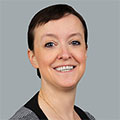

 If there’s one word that perfectly encapsulates how Emily Maier would describe a world without insurance, it would be ‘small’.
If there’s one word that perfectly encapsulates how Emily Maier would describe a world without insurance, it would be ‘small’.
Working for the industry for over three decades, Maier believes insurance has already become the lifeblood of commerce, playing a huge part in the world’s economy and she has been able to witness how the insurance industry has evolved as she worked her way up the career ladder.
Starting as a temporary secretary back in the day, Maier now serves as senior vice president and partner at Woodruff Sawyer, where she runs the transactional insurances practice.
In this interview with Insurance Business, Maier shares her insights about how insurance is faring in the current climate and how it can adapt quickly to the changing technological landscape. She also shares some tips for those people, young or old, who want to venture into the world of insurance.
Insurance Business: What do you love the most about your current organization? What makes it different from other firms in the same space?
Emily Maier: I feel that the people at Woodruff Sawyer have a unique ability to collaborate - they take the time they need for clients and come up with creative solutions. I think this is for a number of reasons: first, we are fully employee-owned which means one person’s success is everyone’s. We avoid a lot of the revenue infighting of other firms.
Woodruff Sawyer takes a long-term view on investing in people, which, I think, gives us the freedom to try new things — like I did when I decided to devote myself full time to the Reps practice. I knew I would be given time and backing and support from the company.
Lastly, I believe we are at a great size — we have expertise in every area but we are still at a size where everyone knows everyone else or at least how to reach out and find the expertise they need very easily.
IB: What or who do you think has been the secret to your professional success? How do they motivate you?
EM: I think there are a few things that power my success: I’m teachable - if someone is better than me at something then I’m not afraid to ask them how they do it and try their strategies out for myself. I’m also surrounded by a lot of people who are great at their jobs and very willing to give their time and experience to me. My husband - he takes primary care of our daughter and without the two of them I would neither have the ability to grow nor as much interest in doing so.
IB: What has been the biggest obstacle you have had to overcome so far as being an insurance professional and what did you do to conquer it? What lessons have you learned?
EM: I think the obstacles I have faced are not specific to insurance. Usually the biggest obstacle is me. I have struggled with not taking criticism well and being quick tempered. The mindset that helps me the most is, “All feedback is just information”. With many examples of acting in haste and regretting it, I’ve finally learned that a quick temper is a hazard.
IB: What do you think are the most challenging issues facing the insurance industry and your line of work today?
EM: I think that technology is very challenging to insurance for a couple of reasons: many insurtech start-ups are developed by people with great technical skill but very little insurance knowledge. They are often shocked by or try to bypass regulations in order to “move fast” and that has proven a terrible mistake and a grave disservice to their clients.
On the other hand, insurance people are great at knowing about insurance but really not good at technology. We keep seeking systems which are a one size fits all solution which doesn’t exist. We are conservative and frugal by nature and so don’t seek to make large investments which is what is going to be required to bring us up to the standards of most industries.
IB: What are your hopes for the insurance industry moving forward?
That we find a way to solve the above problem.
IB: Do you believe that a glass ceiling exists and hinders women from getting opportunities in the insurance space? What should women do to break through?
EM: I can’t speak for the industry as a whole. My own experience is that I work for a company where the board is 50% women, the partners are about 50% women and so I don’t feel a glass ceiling exists. I’m sure that is not true for all parts of my industry and obviously some companies are much more advanced in this area than others. My only advice to women would be look at the make-up of senior people in any company you are thinking of joining. Are there women on the board and other senior positions? If not then I’d avoid it for a couple of reasons: a) you’re going to be limited and b) a company run only be men is going to make worse decisions than one run by a leadership team with diverse ideas, experiences and voices.
IB: If you were to imagine a world without insurance, how would you describe it?
EM: Small. Insurance is the lifeblood of commerce. Nothing happens without it. People would be afraid to start businesses, build houses, hire employees, travel, sit on boards without the ability to offset many of the risks associated with these activities to the insurance market. I think economies would grow more slowly and innovation would be hugely stifled. I think insurance is the unsung hero of the world’s economy.
IB: What advice can you share for those wanting to join the insurance industry?
EM: Take advantage of the many different opportunities out there. Try broking and underwriting, many companies are international and could give you a chance to live abroad. Insurance contains within it hundreds of different careers; claims, sales, risk management, underwriting, consulting etc. You are only limited by your imagination.
IB: What is your philosophy in life? How do you apply that in your career as an insurance professional?
EM: I am most happy and most useful when I can maintain a state of curiosity coupled with gratitude.
Maier takes a spot on Insurance Business’s Hot 100 list for 2019. These 100 insurance professionals have set the industry on fire with their innovative, entrepreneurial, pioneering spirits.
